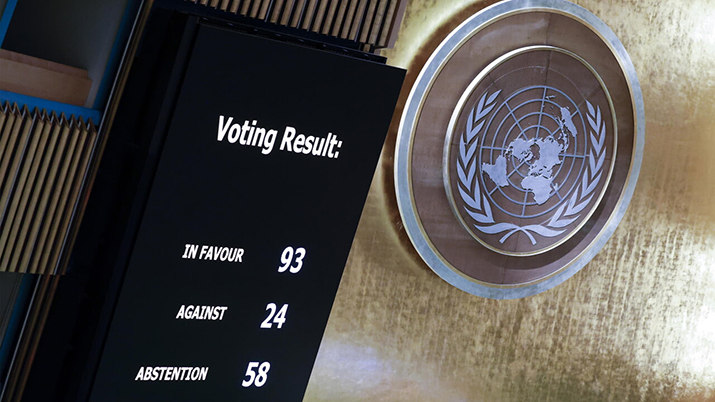HAPPENING AT THE UN
RUSSIA SUSPENDED BY THE HUMAN RIGHTS COUNCIL
On April 7, the United Nations General Assembly approved the suspension of Russia from the Human Rights Council with 93 votes in favour, 24 against and 58 abstentions, due to «the serious and systematic violations and abuses» committed in Ukraine. The Russian Deputy Ambassador to the UN, Gennady Kuzmin, called the vote «a politically motivated illegitimate initiative». Illegitimate, as a criticism, of course, but from what should an expulsion from such an organization be motivated if not a political decision? The question we should ask ourselves is what Moscow has been doing for almost two years in a Council in which to enter one must have made a contribution to the promotion and protection of human rights.
According to data from Amnesty International in 2021, and therefore before the attack on Ukraine, the rights to freedom of expression, association and peaceful assembly were regularly violated in Putin's country. Public assemblies organized by political opposition were almost completely banned. Laws on "foreign agents" and "undesirable organizations" were widely used to suppress dissent. Threats and attacks were aimed at journalists and activists. Torture and ill-treatment in places of detention remained endemic and judicial proceedings against perpetrators were rare. Enforced disappearances were reported in Chechnya. The authorities failed to address the problem of domestic violence. The LGBT population continued to face discrimination and arbitrary deportations of refugees and asylum seekers continued.
War was not needed to expel Russia from the Committee, but moreover how can you entrust a country with this curriculum with a role in monitoring the protection of human rights in the world?
The last time such a suspension was approved was in 2011, when the measure was taken against Libya as a result of violence against demonstrators by forces loyal to the then President Muammar Gaddafi. In fact, initiatives such as that of April 7 are rare at the UN yet, considering the requisites required to become a member of the Council, one would expect them to be placed more often on the agenda of the General Assembly.
The organisation still includes other countries that do not fully comply with the principles they are obliged to protect
Russia is not the only presence on the Committee that is difficult to justify. One wonders for example, how the election of Venezuela was possible, which certainly does not shine out of respect for human rights. The same doubts could be raised concerning Somalia, at war since 1991, dismembered, partly under the control of the jihadist group al Shabaab, or for that matter Sudan, where ethnic conflict is extremely high, coups d'état follow one after the other and protests by the people are repressed. We could go on, but the conclusion would always be the same: it is difficult to denounce violations of human rights for an organisation in which nations that do not fully apply the principles they are obliged to defend remain members. It is therefore understandable why Russia was not expelled by a unanimous vote.
Perhaps it is time to demand respect for human rights, even in times of peace, at least from the countries called to protect them.







